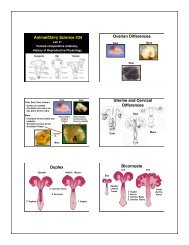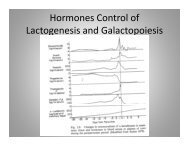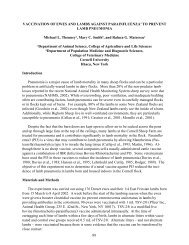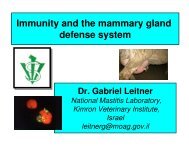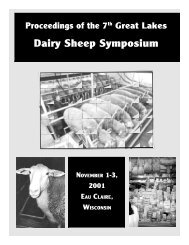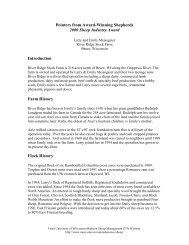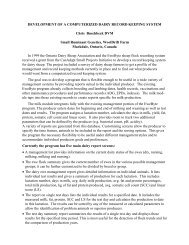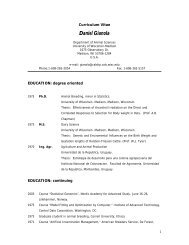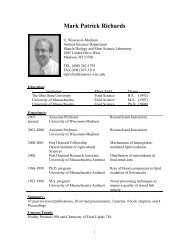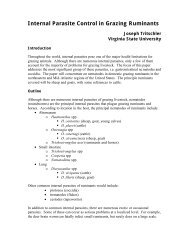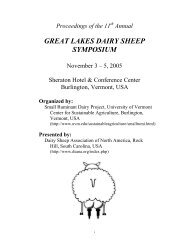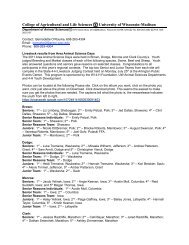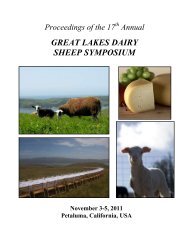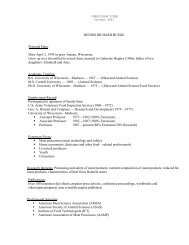great lakes dairy sheep symposium - the Department of Animal ...
great lakes dairy sheep symposium - the Department of Animal ...
great lakes dairy sheep symposium - the Department of Animal ...
You also want an ePaper? Increase the reach of your titles
YUMPU automatically turns print PDFs into web optimized ePapers that Google loves.
ingredients.” For guidelines on this distinction and labeling requirements, see <strong>the</strong> NOP<br />
Rule.<br />
• Any o<strong>the</strong>r agricultural ingredients, such as flavorings (i.e. dill, basil, etc.) must be<br />
certified organic, if commercially available.<br />
• Any non-agricultural ingredients, such as salt, or calcium chloride, unless <strong>the</strong>y are on <strong>the</strong><br />
non-allowed list <strong>of</strong> <strong>the</strong> NOP, are allowed as long as <strong>the</strong>y do not have prohibited additives<br />
such as flowing agents.<br />
• Cultures and coagulants must by non-GMO. This will be a big issue, as although non-<br />
GMO are available, <strong>the</strong> GMO products are most commonly used. The cheesemaker must<br />
source non-GMO products and closely record <strong>the</strong>ir use and storage to prove no<br />
contamination has occurred.<br />
• Most sanitary practices are <strong>the</strong> same as for non-organic, but all surfaces touched by<br />
organic raw or finished products must be well flushed by water after any cleaning or<br />
sanitizing products have been used. Ei<strong>the</strong>r testing must be done or protocols developed to<br />
prove that <strong>the</strong> surface residue only contains pure water.<br />
• Any pest control must be mechanical within areas where organic raw or processed<br />
product is. If non-approved pest control methods are used (ie spraying cracks) a<br />
withdrawl period is mandated. Chemical fogging to prevent bacterial contamination is not<br />
allowed.<br />
Conclusion<br />
Organic production will not be for everyone. Organic cow <strong>dairy</strong> producers have said that<br />
organic production requires more overall management <strong>of</strong> <strong>the</strong> farm system. But <strong>the</strong>y also say that<br />
organic production is “less stressful and more fun.” Organic success is frequently based on <strong>the</strong><br />
development <strong>of</strong> custom solutions for each unique situation. <strong>Animal</strong> health tends to improve<br />
under organic management, as concentration on immune system function develops stronger<br />
animals. Breeding selection and culling are important tools; over time a flock with specialized<br />
traits to thrive within a given organic farm system can be developed. Organic systems are kind<br />
on <strong>the</strong> environment and when well managed, build soil and preserve resources.<br />
Consumers continue to show growing support for organic products. They identify organic<br />
with health, good taste and quality. They are loyal consumers, willing to pay for <strong>the</strong> qualities<br />
organic products encompass. Combined with family-farmed, pasture-raised or local, as many<br />
organic <strong>sheep</strong> products are, organic is a strong sales incentive. Organic <strong>sheep</strong> <strong>dairy</strong> products<br />
make sense and would <strong>of</strong>fer a quality product to a willing audience.<br />
Resources:<br />
Midwest Organic and Sustainable Education Service, MOSES . PO Box 339, Spring Valley,<br />
WI 54767. www.mosesorganic.org, 715-772-3153. Fact sheets, Guidebook to Organic<br />
Certification, Largest Organic Conference in <strong>the</strong> U.S., annually in Feb. in WI. Organic<br />
Broadcaster Newspaper, Upper Midwest Organic Resource Directory.<br />
18



